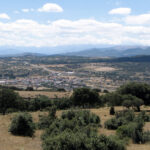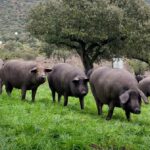In today’s world, where sustainability has become an unavoidable priority, the Iberian pork industry has been able to adapt by incorporating practices aligned with the principles of the circular economy. This vision not only seeks to minimise waste, but also to maximise the value of each resource, optimising processes from breeding to product marketing.
Nothing goes to waste
Traditionally, the pig has been a symbol of integral utilisation, hence the saying “pork to the bone”. In the case of the Iberian pig, this idea has been perfected through techniques that not only respect this cultural heritage, but also align it with modern, ethical and efficient production.
Firstly, the selection of lean meats for the production of products such as Iberian chorizo, Iberian salchichón or Iberian loin loin is based on a logic of utilisation in which each piece finds its ideal function. The noble parts are used for high-quality cured sausages, while other parts are used in cooked products, traditional stews or even gourmet preparations.
In addition, the by-products of the Iberian pig -fats, bones, skins- are used in different industries: from cosmetics to pharmaceuticals and animal feed. Even the organic waste generated during the process can have a second use as natural fertilisers or biofuels, thus closing the cycle of use.
Natural resources
The circular economy also manifests itself in the responsible use of natural resources. For example, the dehesas, a key ecosystem for rearing Iberian pigs, are managed sustainably to ensure their regeneration. This includes tree maintenance, pasture rotation and biodiversity conservation. In turn, this ecological balance allows the pig to be fed with natural resources – such as acorns – without depleting the environment.
In the curing and processing phases, many companies in the sector – including Garimori – opt for natural drying sheds, which reduce energy consumption and respect traditional curing times. Technologies have also been incorporated that optimise the use of water, reduce emissions and reduce waste in packaging and transport.
Traceability
Another key aspect is traceability, which allows rigorous control over the origin and use of each element. This not only guarantees the quality of the final product, but also facilitates the implementation of systems that avoid unnecessary losses and allow the reuse of resources at different points in the process.
Sustainability
In short, the circular economy is not a passing trend, but a necessity that the Iberian sector has been able to integrate without renouncing its essence. Committing to the integral use of the Iberian pig not only honours tradition, but also ensures a more responsible and sustainable future for one of the gastronomic jewels of the Iberian Peninsula.





